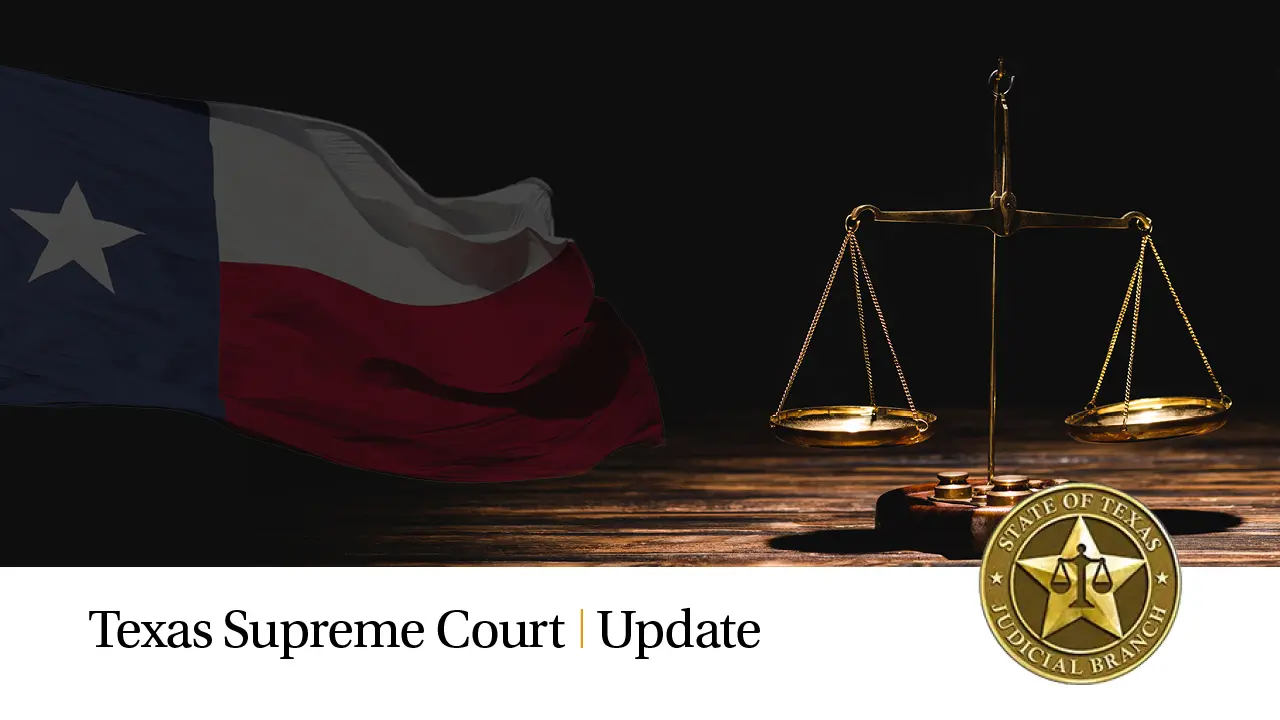
The following are summaries of selected opinions issued by the Texas Supreme Court in March and April 2025. These summaries are prepared by court staff as a courtesy. They are not a substitute for the actual opinions. The summaries are overviews; please review the entire opinions.
Kensington Title-Nevada, LLC v. Tex. Dep’t of State Health Servs., ___ S.W.3.d ___, 2025 WL ___ (Tex. Mar. 28, 2025) [23-0644]
This case addresses when a party can obtain a declaratory judgment regarding the applicability of an administrative rule under Section 2001.038(a) of the Administrative Procedure Act.
Kensington acquired real property in Denton, Texas, on which the prior owners had left behind radioactive personal property. Shortly thereafter, Kensington began implementing a plan approved by the Department of State Health Services to clean up the material, but Kensington ceased those activities when it was brought into an ongoing tax suit against the prior owners that subjected the radioactive personal property to a lien. The Department issued a notice that Kensington violated an administrative rule by possessing radioactive material without a license, and it sought a penalty. An administrative law judge found a violation and recommended a $7,000 penalty, which the Department adopted.
In the pending tax dispute, Kensington amended its pleading to add a cause of action under Texas Government Code Section 2001.038(a) to declare the rule inapplicable, arguing that Kensington neither owned nor possessed the material. The Department filed a plea to the jurisdiction, arguing Kensington challenged the Department’s application of the rule rather than the rule’s applicability, and thus the Department’s immunity from suit was not waived. The trial court denied the Department’s plea, but the court of appeals reversed, holding that Kensington’s Section 2001.038(a) challenge failed to allege a proper rule-applicability challenge.
The Supreme Court reversed. The Court first held that Kensington had standing to bring a Section 2001.038(a) challenge because Kensington alleged that the Department rule, if enforced, would interfere with Kensington’s rights and the requested declaration would redress its injury. The Court then held that Kensington alleged a proper rule-applicability challenge, explaining that Kensington’s request for a declaration of whether the Department’s rules could apply to non-licensees like Kensington—who own real property on which radioactive material was abandoned— falls within the statute’s scope. The Court remanded the case to the trial court to resolve the merits of the challenge.
Save Our Springs All., Inc. v. Tex. Comm’n on Env’t Quality, ___ S.W.3d ___, 2025 WL ___ (Tex. Apr. 11, 2025) [23-0282]
This suit for judicial review involves claims that TCEQ (1) misapplied its “antidegradation” rules in granting a wastewater discharge permit and (2) failed to make “underlying fact” findings as required by section 2001.141 of the Administrative Procedure Act.
TCEQ rules prohibit permitted discharges into high-quality waterbodies that would either (1) disturb existing water uses or (2) degrade water quality. The City of Dripping Springs applied for a permit to discharge wastewater into Onion Creek. Predictive modeling estimated that dissolved oxygen levels at the mixing point would drop more than 20% but would remain at sufficient levels to protect existing uses and then quickly return to baseline levels. Taking into consideration other water-quality parameters, TCEQ’s Executive Director concluded that overall water quality would not suffer and proposed to grant the City’s application.
Contested-case and judicial-review proceedings ensued. A local environmental group, Save Our Springs Alliance, asserted that a significant reduction in dissolved oxygen level constitutes degradation of water quality as a matter of law. The administrative law judge rejected SOS’s parameter-by-parameter antidegradation methodology as reflecting a misreading of the applicable rules. TCEQ agreed and granted the permit. The reviewing courts split on the matter. Reading the rules as requiring a parameter-by-parameter degradation analysis, the trial court vacated and enjoined the City’s permit. A divided court of appeals reversed and upheld the permit.
The Supreme Court affirmed, holding that TCEQ did not misread or misapply its rules. TCEQ’s practice of assessing degradation of water quality on a whole water basis, rather than affording decisive weight to numeric changes in individual water-quality parameters, conforms to the antidegradation standards as written. SOS’s additional complaint that TCEQ’s final order was void for want of sufficient underlying fact findings was not preserved for judicial review. That complaint also failed on the merits because the language in TCEQ’s antidegradation rules is not “statutory language” for which section 2001.141 requires additional fact findings.
City of Killeen–Killeen Police Dep’t v. Terry, ___ S.W.3d ___, 2025 WL ___ (Tex. Apr. 25, 2025) (per curiam) [22-0186]
The issue in this case is whether the Texas Tort Claims Act waived the City of Killeen’s governmental immunity in a suit involving a collision with a police cruiser.
Terry sued the City’s police department after a police cruiser responding to a 9-1-1 call struck his vehicle. The City filed a plea to the jurisdiction asserting governmental immunity. The trial court denied the plea, and the court of appeals affirmed.
The Supreme Court held that the court of appeals’ analysis was inconsistent with its recent decision in City of Austin v. Powell, 704 S.W.3d 437 (Tex. 2024). Under Powell, which addressed the Tort Claims Act’s “emergency exception,” a court must first assess compliance with any applicable laws or ordinances and only then, and if necessary, turn to assessing the officer’s alleged recklessness. Moreover, this suit also implicates the Tort Claims Act’s distinct 9-1-1 exception, which may independently remove the plaintiff’s claims from the Act’s immunity waiver and should be addressed on remand.
Accordingly, the Supreme Court granted the City’s petition for review, vacated the court of appeals’ judgment, and remanded the case to the court of appeals for further proceedings.
